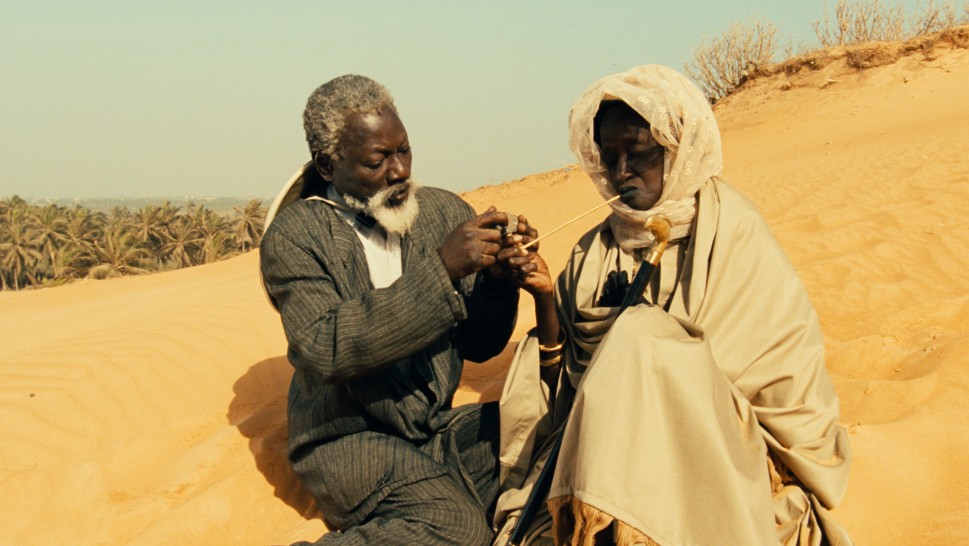
Djibril Diop Mambéty's Cinema of Possibility
Djibril Diop Mambéty (1945 - 1998) has been described as an actor, orator, composer and poet, deservedly, besides a legendary African filmmaker and—thanks in part to his prénom—an “Angel.” He was born near Dakar in Kolobane, Senegal. “All my films speak about the city I was born in,” he’d once claim, “from the outskirts to the capital itself, because the road from your birthplace to the capital is always the path of a desire called emancipation.” He studied theatre at first, working on the stage after graduating from acting school, before losing his job at the Daniel Sorano National Theatre and then teaching himself the “Seventh Art.” Ultimately, he joins an amazing cinematic pantheon. After the late Pan-African greats Ousmane Sembène and Med Hondo, as well as Haile Gerima and Sarah Maldoror, this “Prince of Kolobane” came to innovate filmmaking for all Africa and the world with his signature mix of wild narrative style, rich traditional symbolism and virtuoso editing technique with impeccable political commitment.
For some, his “magnum opus” would be Hyènes, a stunning, sardonic tale of human consumption and World Bank colonialism (“a structural adjustment plan for souls and values”). His career on celluloid began at the age of twenty-three with two shorts: Contras’ City (1969) and Badou Boy (1970). The latter won the Silver Tanit award at the Carthage Film Festival. However, it was his debut feature that took the world by storm: Touki Bouki. Its formal sophistication and Afro-cosmological audacity captivated audiences and critics alike. A peerless audio-visual experience ready-made for the global migration drama of today, it earned major awards at Cannes and the 8th Moscow International Film Festival. Next came an enigmatic hiatus. Mambéty did not release another work for two decades, except one documentary short: Parlons Grand-mère (Let’s talk, Grandmother, 1989). This is no trivial moment in his catalogue. For, against the basics of film school orthodoxies, Mambéty highlights a core antagonism between “Grandma” and “grammar” (the two terms homonymous in colonial French), to insist upon the importance of making a film language of one’s own for African cinema: “Grandma wants us to reinvent grammar every time…. She tells me: ‘Go bash its face in … because all this space belongs to you, my grandson.’ Grandma has asked me to always reinvent her stories. To never stop recreating it to ensure her perpetuity.” He loved to define cinema as magic and dreams, possibility and small wonders, something only possible for him with its necessary reinvention – “as long as you’re not its slave.” Mambéty would reappear in 1992 to reinvent his own voice for Hyenas, a voluptuous epic and sort of allegorical sequel to Touki Bouki, which was well-nigh Hip-Hop in cuts and pace, while Hyènes flows so slowly and marvelously, like Big Momma’s molasses.
On July 23, 1998, his body succumbed to lung cancer—only 53 years old. Yet this could not stop the magic of Djibril Diop Mambéty. He’d been preparing a striking trilogy of short films, entitled Tales of Ordinary People (or, Contes des petites gens) as a whole. It includes Le Franc as well as La Petite Vendeuse du Soleil, which is to say, The Little Girl Who Sold the Sun, a posthumous marvel likely to steal every spectating heart. Touki Bouki and Hyenas were to comprise two parts of a dramatic series on “Power and Madness” themselves. There is also his virtually dateless collaboration with René Vautier’s Le Glas, in which Mambéty narrates poetry in homage to three Zimbabwe African People’s Union martyrs over a Black Panther Party music soundtrack. His spectacular legacy lives on and perhaps strongest in the country of his birth. He actually named Waru Studio in Senegal, the youthful art-lab base of Fatou Kande Senghor’s current Wala Bok imaginings in Pan-African music, television and film. Waru translates as “Wonderment.” What’s more, for the Dakar Biennale of 2018, Djibril Dramé and the slammeur “Minus” paid homage to the cinéaste by restaging his film-work in a photography-installation laying out twenty scenes from Badou Boy and Touki Bouki. Mambéty’s belief in Africa’s masses of was hardcore; and so is their everlasting belief in Mambéty. Hence, speaking of them and Hyenas, he maintains with that voice of an “Angel”: “If we are able to demystify wealth, the future of Africa is brilliant…. The future of Black people resides in its mission that goes back to the age of the pyramids and spreads far beyond. We do not cease to produce beauty. We only need be wary of the pathetic contagion of Western ‘Enlightenment,’ which is really not illumination at all, but simply electricity.” – Greg Thomas











